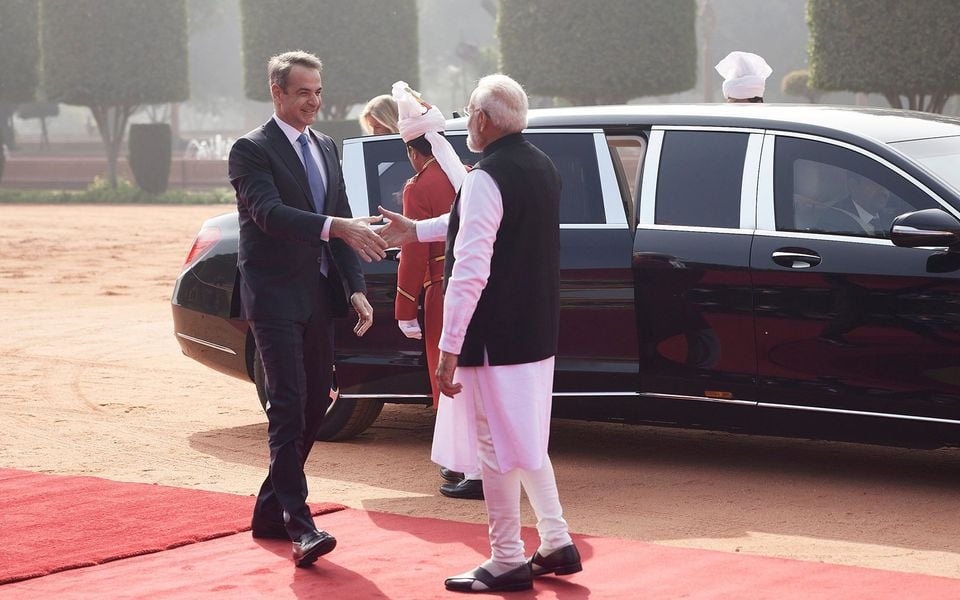The world as we knew it no longer exists. What once was may be of interest to historians, but it has lost strategic relevance. In this new era of geopolitical uncertainty, governments, diplomats – and, increasingly, military institutions – are focused on building new networks and alliances to prepare for emerging challenges. Some of these realignments are giving rise to unexpected new constellations.
This commentary explores two geographically distant regions – the Eastern Mediterranean and South Asia – that are drawing politically closer in light of broader geostrategic shifts. Both are marked by deeply entrenched bilateral rivalries that have long threatened regional peace: the Greek-Turkish conflict in the Mediterranean and the Indo-Pakistani antagonism in South Asia. Memories of bloody wars and pogroms, unresolved border disputes, enduring enmities, and climates of mutual mistrust continue to block the path toward stability and shared forward-looking vision – on the southeastern fringes of Europe as well as the Indian subcontinent.
As they seek new strategic partners, political actors in both regions are increasingly looking beyond their immediate neighborhoods. While Ankara is systematically deepening its ties with the Islamic Republic of Pakistan, Greece, and more recently Cyprus are expanding their alliance with India, Pakistan’s regional adversary.
The term “alliance” is used deliberately. In the emerging world order, military considerations are playing a more prominent role – also in the Ankara-Islamabad and Athens-New Delhi relationships. When Turkish Foreign Minister Hakan Fidan visited Pakistan in early July, accompanied by Defense Minister Yasar Guler, defense cooperation stood at the center of the visit. According to Reuters, Guler stressed the importance of joint initiatives in military technology, particularly aviation and drone development. As early as February, the two countries had signed a declaration emphasizing the “deepening diversification and institutionalization of the strategic partnership.” Today, Turkey is Pakistan’s second-largest arms supplier after China; roughly 10 percent of Turkish-made defense products, according to media reports, are exported to Pakistan.
Turkey’s focus on Pakistan is notable in that it bucks a broader trend. “While key actors in the Islamic world are increasingly aligning their South Asia policies with India, Turkey continues to strengthen its strategic partnership with Pakistan,” observes Harsh Pant of the Observer Research Foundation (ORF) in New Delhi.
Ankara’s ambitions are not limited to Pakistan. Bangladesh – India’s eastern neighbor – is increasingly factoring into Turkey’s broader regional strategy. Haluk Gorgun, the head of Turkey’s state defense conglomerate SSB, recently traveled to Dhaka, where he received a strikingly warm welcome from the country’s highest political and military circles. Once again, weapons cooperation topped the agenda – including plans to build up local production capacities. Ankara clearly seeks long-term strategic partnerships, not short-term commercial deals. Indian media outlets have begun to warn of an emerging Turkey-Pakistan-Bangladesh triangle. Meanwhile, accusations that Ankara and Islamabad are exerting influence in Nepal through Islamic organizations and mosque associations have further fueled anti-Turkish sentiment.
While Ankara is systematically deepening its ties with the Islamic Republic of Pakistan, Greece, and more recently Cyprus are expanding their alliance with India
In what amounts to a striking parallel – one might even speak of a synchronization – India and Greece are deepening their ties. In February 2024, Indian Prime Minister Narendra Modi and his Greek counterpart Kyriakos Mitsotakis agreed to a strategic partnership, with their joint declaration giving particular weight to military cooperation. Here, too, the two countries are going beyond symbolic gestures, committing to “their shared goal of enhancing defense cooperation, including industrial collaboration and technological innovation in the arms sector.” The partnership has already moved into implementation: Joint naval exercises between the Greek and Indian navies have taken place, and high-level military visits have followed.
Modi’s June visit to Cyprus – the first by an Indian head of government in two decades – also fits into this evolving framework. The trip was widely described in the media as “historic,” and again, defense was a central theme.
When foreign dignitaries visit the Republic of Cyprus, the hosts typically expect clear expressions of political support for their diplomatic stance on the island’s long-standing division. Modi, speaking for the world’s most populous democracy, delivered precisely that. In the words of the official joint statement, “India reaffirmed its unwavering and consistent support for the independence, sovereignty, territorial integrity, and unity of the Republic of Cyprus.”
In Pakistan, the developments in Cyprus have been viewed very differently. Earlier this year, Prime Minister Shehbaz Sharif drew international attention when, during a press conference in Ankara with President Recep Tayyip Erdogan, he declared Pakistan’s support for “the people of the Turkish Republic of Northern Cyprus.” While this does not (yet) amount to formal recognition of the breakaway republic – recognized only by Ankara and dismissed by Greece and Greek Cypriots as a “pseudo-state” – Pakistan is nevertheless among Turkey’s closest political allies. It is therefore no surprise that Ankara reciprocates Islamabad’s support on Pakistan’s own core issues. During a recent visit, Sharif thanked Erdogan for his “unwavering support on the Kashmir issue.”
An old rule of international politics holds that the enemy of my enemy is my friend. That adage is playing out anew in the Eastern Mediterranean and South Asia, where new alliances are forming along the lines of old rivalries. They are pieces of a larger mosaic – a new geostrategic order taking shape as the fragile architecture of the old one crumbles.
Dr Ronald Meinardus is a senior research fellow at the Hellenic Foundation for European and Foreign Policy (ELIAMEP).
